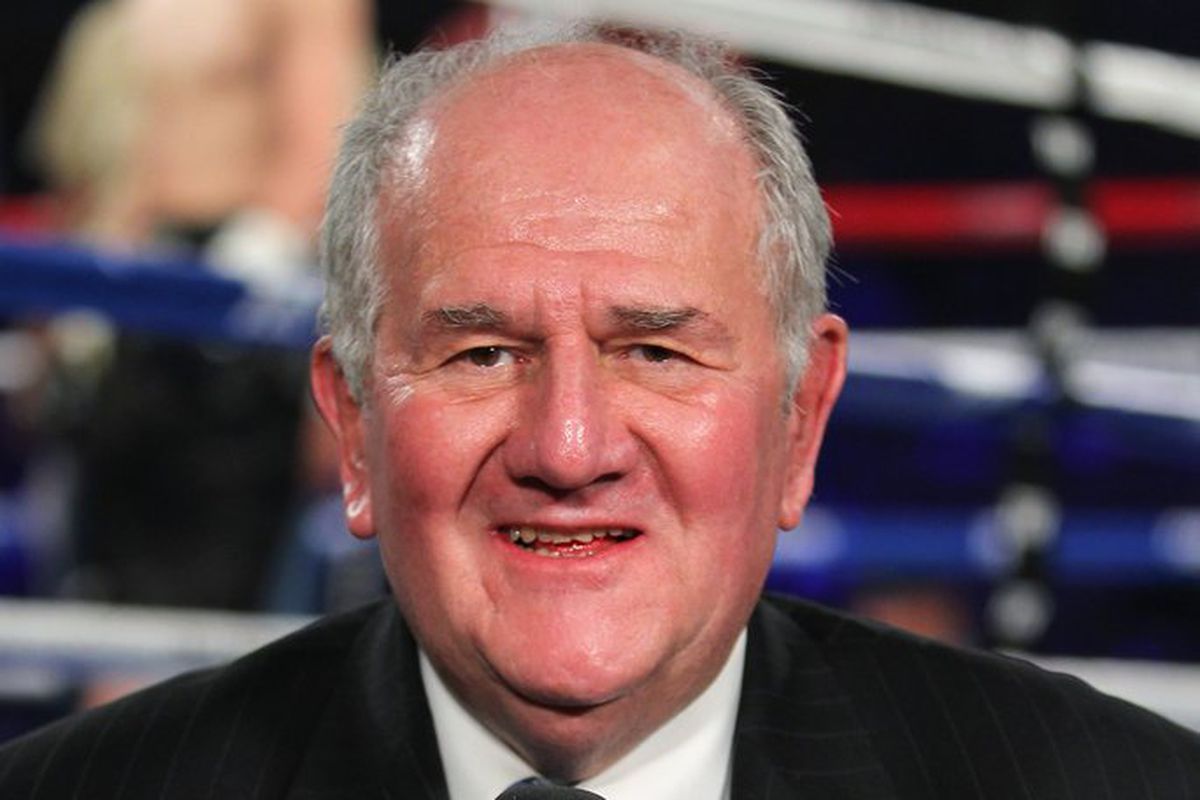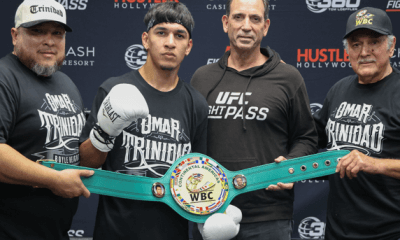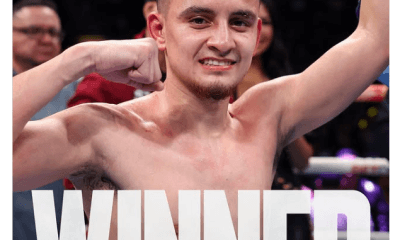Featured Articles
Harold Lederman’s Distinctive Voice Has Been Stilled and Boxing is Poorer for It

Not so very long ago, perpetually cheerful Harold Lederman, stricken with cancer and getting more and more ill every day, was asked if he could recall the last time he had gotten angry, as is sometimes the case with, you know, most normal people.
“Who knows?” the longtime “unofficial judge” of HBO Boxing responded in the same high-pitched, distinctive and enthusiastic voice that was just one of his distinguishing features. “There’s not enough time in life to get angry.”
There is, however, always time to be sad, and this is another of those occasions. Harold Lederman, boxing’s happiest proponent and one of its most sincerely nice ambassadors, was 79 when he passed away Saturday in hospice care in Rockland County, New York. His family was at his side, and it just stands to reason he left this life the way he lived it, as upbeat and positive as ever. Not even the ravaging disease that slowly and painfully moved him ever closer to the eternal 10-count that awaits everyone could strip him of his smile. And why should it have? Harold enjoyed the whole ride, and he was never more in his comfort zone than when he was at ringside, scoring fights as an official judge (he worked more than 100 world title bouts until his retirement in 1999) or an unofficial one for HBO, a labor of love that spanned from his hiring in 1986 to the premium-cable’s last fight telecast, on Dec. 8 of last year, over 1,000 fights in all. His worsening health prevented him from traveling toward the end, but he remained on the job off-site, determined to go the distance.
“It was one of the greatest privileges of my broadcasting career to work with Harold Lederman, whose unique humanity and lifelong love of boxing brought joy to the hearts of millions of fans, show after show after show,” Harold’s longtime broadcast partner, blow-by-blow announcer Jim Lampley, said in a prepared statement. “The world waited for his moments, they were thrilled by his insights, they gloried in imitating his voice. No one in the sport had more friends, because no one in the sport was more deserving of friends.
“As deeply saddened as I am by his passing, I am equally deeply joyful that he made it to the final bell on Dec. 8. Nothing was more important to the legacy of HBO Boxing, so in that we can take solace now that his scorecard is complete.”
Similar tributes poured in from Peter Nelson, executive vice president of HBO Sports, and one of Nelson’s predecessors at HBO, Lou DiBella, now a promoter. Even though the fight the beloved Lederman was waging was one he was destined to lose, that inevitability did not serve to soften the blow for his many admirers.
“I know Harold was suffering and I knew he was in hospice,” DiBella said. “Harold was truly one of a kind. He had no malice toward anyone in this world. No one loved boxing more than Harold Lederman. He was as loyal to boxing and to fighters as he was to his own family, and that was as loyal as can be.
“In a lot of ways, HBO Boxing is now dead, but nobody represented HBO Boxing better than Artie Curry (whose official title was manager of HBO Sports Talent Relations), may he rest in peace, and Harold Lederman. I’ve known Harold my whole 30 years in boxing. Any show that Harold could physically attend, when he was working in a pharmacy, he was there. Harold lived boxing, Harold loved boxing and Harold died boxing. He was one of a kind and there will never be another like him in boxing.”
That might be truer now than ever before. The Lederman brand of relentless optimism – about life, about boxing, about anything – was once shared by several marvelous individuals in the sport who had a special gift for making anyone who came into contact with them feel good. But one by one, those who shared Lederman’s passion for boxing, which also is populated by those with darker sides, have taken their leave. Legendary trainer Angelo Dundee was 90 when he passed away on Feb. 1, 2012; journalist and raconteur Bert Sugar was 75 when he died on March 25, 2012; Northern California promoter Don Chargin was 90 when he left us on Sept. 28, 2018, followed shortly thereafter by New York Times and Pulitzer Prize winner Dave Anderson, who was 88 when he passed on Oct. 4, 2018.
What all of the aforementioned shared, other than their professional acumen, was the ultimate tribute of being inducted into the International Boxing Hall of Fame. Lederman got his call to the hall in 2016, and during his four days in Canastota, N.Y., he seemed more like a little kid on Christmas morning who awakened to find every gift he ever wanted under the tree. Then again, Harold – his day job was as a pharmacist, but the Bronx native and Columbia University grad couldn’t possibly have been as satisfied filling prescriptions as he was chatting up fight fans – didn’t lack for validation in his other job, the one which made him famous. He was inducted into the World Boxing Hall of Fame in Los Angeles in 1997 and was twice honored by the Boxing Writers Association of America, receiving the Marvin Kohn Good Guy Award in 2006 and the Sam Taub Award for broadcast excellence in 2009.
Actually, Lederman made it a hat trick from the BWAA when, on May 11 of last year – ironically, exactly one year prior to his death – he received a special citation at the organization’s annual award dinner for being, well, Harold Lederman.
“Harold is the mayor at ringside of every fight he goes to,” Lampley said of his dear friend preceding that event. “Whether it’s in the United States or on foreign soil, Harold knows everybody and everybody knows Harold. He’s a global ambassador for boxing, and his enthusiasm for life is wonderful. Harold is ebullient about everything. He’s ebullient about what he ate for breakfast. That’s the glory of Harold.”
And if he wasn’t always crazy about breakfast, he likely wouldn’t have complained to his waiter in any case. My wife and I were privileged to be at the same table as Harold and his wife Eileen for the wedding of one of former BWAA president Jack Hirsch’s daughters. Harold’s unofficial scoring of the quality of the varied dessert items would have had any pastry chef beaming with pride.
“It’s unusual for someone who has been part of boxing for as long as Harold to maintain a wide-eyed enthusiasm for the sport,” another longtime broadcast partner, Larry Merchant, said prior to the BWAA awards dinner in 2018. “Harold has a wide-eyed enthusiasm for boxing that’s beyond compare. When we do a show at an arena away from the hotel we’re staying in, HBO arranges for a car to take us to the arena. Harold never goes with us. That’s because, without fail, he’s at the arena hours ahead of us, watching every preliminary fight, saying hello to every judge and shaking hands with virtually every fan in the arena.”
In addition to his wife Eileen, Harold Lederman is survived by daughters Julie and Iris. Julie followed in her father’s footsteps and also is a boxing judge who has drawn assignments to a number of big-time bouts.
Funeral arrangements are pending.
Bernard Fernandez is the retired boxing writer for the Philadelphia Daily News. He is a five-term former president of the Boxing Writers Association of America, an inductee into the Pennsylvania, New Jersey and Atlantic City Boxing Halls of Fame and the recipient of the Nat Fleischer Award for Excellence in Boxing Journalism and the Barney Nagler Award for Long and Meritorious Service to Boxing.
Check out more boxing news on video at The Boxing Channel
To comment on this story in The Fight Forum CLICK HERE
-

 Featured Articles3 weeks ago
Featured Articles3 weeks agoThe Hauser Report: Zayas-Garcia, Pacquiao, Usyk, and the NYSAC
-

 Featured Articles2 weeks ago
Featured Articles2 weeks agoOscar Duarte and Regis Prograis Prevail on an Action-Packed Fight Card in Chicago
-

 Featured Articles1 week ago
Featured Articles1 week agoThe Hauser Report: Cinematic and Literary Notes
-

 Book Review4 days ago
Book Review4 days agoMark Kriegel’s New Book About Mike Tyson is a Must-Read
-

 Featured Articles4 weeks ago
Featured Articles4 weeks agoManny Pacquiao and Mario Barrios Fight to a Draw; Fundora stops Tim Tszyu
-

 Featured Articles4 weeks ago
Featured Articles4 weeks agoArne’s Almanac: Pacquiao-Barrios Redux
-

 Featured Articles3 weeks ago
Featured Articles3 weeks agoRemembering Dwight Muhammad Qawi (1953-2025) and his Triumphant Return to Prison
-

 Featured Articles4 weeks ago
Featured Articles4 weeks agoOleksandr Usyk Continues to Amaze; KOs Daniel Dubois in 5 One-Sided Rounds


















